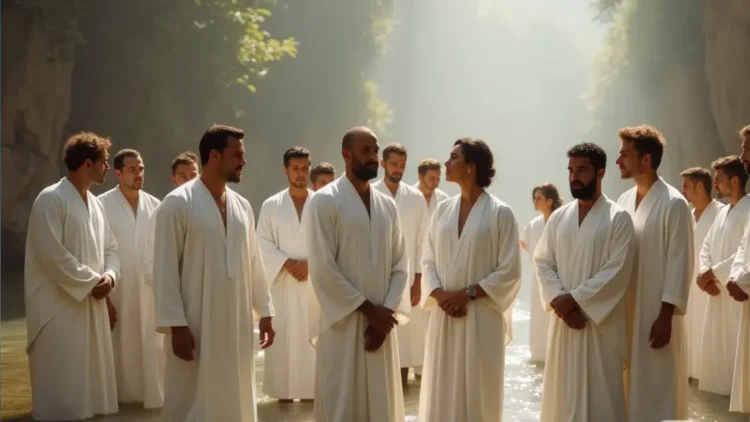Introduction: Bible Verses About Baptism
What is baptism according to Scripture?
First of all, baptism in the Bible is not just a symbol; it is a direct command from Jesus Christ. It shows that someone has changed on the inside and is starting their journey in the Christian faith. Lets look some Bible verses about Baptism.
Matthew 28:19 says, “Go therefore and make disciples of all nations, baptizing them in the name of the Father and of the Son and of the Holy Spirit.”
This verse makes it clear that baptism is based on obedience and being a disciple. It’s not just about the water; it’s about what it means to make a promise. People often ask, “Why do I need to be baptized?” The Bible gives us this first, clear answer: it’s part of following Jesus. It becomes the public declaration of a personal decision to walk in faith.
The early significance of baptism in the Church
It was one of the first things people did after they accepted Jesus’ message in the early church. There was no waiting or arguing; it happened right away.
“Peter replied, ‘Repent and be baptized, every one of you, in the name of Jesus Christ for the forgiveness of your sins.'” This is what Acts 2:38 says.
This shows how closely it was linked to repentance and forgiveness. It was a big deal for the first Christians. It meant getting rid of sin and starting over with a new life. From the start, people who believed responded to the Gospel with faith, repentance, and baptism all at once. Christians still follow that pattern today.
Baptism as a sign of a new life
It is also a strong picture of dying to the old self and coming back to life as a new one.
Romans 6:4 says, “We were therefore buried with him through baptism into death in order that, just as Christ was raised from the dead… we too may live a new life.”
This verse does a great job of explaining what this means. When a person is baptized, they are making a choice to walk in a different direction and leave their past behind. It shows that faith isn’t just a feeling; it changes your whole life. It’s both a goodbye and a hello: goodbye to the past and hello to a future with Christ. Baptism makes this change that can’t be seen clear.

Baptism and Salvation
For the forgiveness of sins
Now, one of the most straightforward inquiries concerning salvation is whether baptism is actually required. The Bible helps us understand.
Acts 22:16 states: “What are you waiting for now? Get up, call on his name, get baptized, and have your sins forgiven.
This demonstrates how it was viewed as the symbolic washing away of sin. It was faith in action, not just water. This verse reassures new converts that baptism is a time of purification and submission. It marks a turning point in their spiritual journey and brings them inner peace.
Baptism as an act of faith
Of course, it is not magic. Because it is done with faith, it works. The faith that leads to it is what saves people, not the water itself.
For this reason, 1 Peter 3:21 states, “And this water symbolizes baptism that now saves you… not the removal of dirt from the body but the pledge of a clear conscience toward God.”
This verse clarifies that God is pursuing the heart. It turns into a reaction, a declaration made in public that expresses one’s faith. It is therefore a step that validates what a believer has already come to believe in their heart.
Faith and baptism go hand in hand
Furthermore, baptism and faith are inextricably linked. Naturally, one leads to the other.
Jesus states, “Whoever believes and is baptized will be saved, but whoever does not believe will be condemned,” in Mark 16:16.
It is evident that while belief serves as the cornerstone, baptism completes the response. It is the outward manifestation of a person’s faith in Christ. It’s how we express our belief to the world. And in doing so, we adhere to the model that Christ Himself established. While faith through it shines brightly, faith without action can feel hidden.

Bible Verses About Baptism of Jesus as an Example
John the Baptist baptizes Jesus.
Remembering that even Jesus was baptized is always encouraging. He did it to set an example even though he didn’t need forgiveness.
According to Matthew 3:13–17, “Then Jesus traveled from Galilee to Jordan to be baptized by John.
Heaven opened as soon as Jesus was baptized. This was not just a ceremonial occasion; it marked the start of His public ministry. Jesus demonstrated to us that being baptized is an essential component of living in obedience. It is undoubtedly a necessary step for every believer to take if the Son of God chose it.
Why, despite his innocence, Jesus was baptized
Some people question why Jesus, who was sinless, required baptism at all. His desire to uphold righteousness and relate to us is the answer.
In Matthew 3:15, Jesus states, “Let it be so now; it is proper for us to do this to fulfill all righteousness.”
He did it for us, not for himself. He was demonstrating that He understood every aspect of the human experience, including the necessity of walking in obedience. Because it is about choosing to follow rather than being flawless, it has even greater significance.
God’s blessing during Jesus’ baptism
Finally, Jesus’ baptism was a significant event because it was God’s public affirmation of Him.
“And the Holy Spirit descended on him in bodily form like a dove,” according to Luke 3:22. “You are my Son, whom I love; I am well pleased with you,” said a voice from heaven.
This verse demonstrates how baptism is a profoundly spiritual practice in addition to being a human act. By doing this, we, like Jesus, align ourselves with God’s will. And we can have faith that God will see and reward that obedience.

The Holy Spirit
Receiving the Holy Spirit
First of all, the gift of the Holy Spirit is one of the most exquisite promises associated with baptism. Many new converts are curious about what happens after baptism—is there a shift, a sign, or an emotion?
Peter provides a clear response in Acts 2:38: “For the forgiveness of your sins, repent and be baptized in the name of Jesus Christ, everyone. And the Holy Spirit will be given to you as a gift.
This indicates that the Spirit is available to all believers who respond in faith and obedience, not only those in the early church. It’s not about feelings; rather, it’s about God’s promise being realized in our lives following that crucial baptismal step.
When Jesus was baptized, the Spirit descended
It’s interesting to note that the Holy Spirit was strongly involved in Jesus’ baptism as well. John the Baptist knew that something divine was taking place when he saw it.
“I saw the Spirit descend from heaven as a dove and remain on him… the man on whom you see the Spirit descend and remain is the one who will baptize with the Holy Spirit,” he states in John 1:32–33.
This was more than just a historical event; it established a standard for how the Spirit functions in a believer’s life. When we follow in obedience through it, we too openly receive God’s presence, just as Jesus did.
Baptism and spiritual empowerment
Furthermore, spiritual empowerment is frequently associated with baptism, making it more than just a symbolic event. Even before it, the Holy Spirit is shown to descend upon non-Jewish believers in
Acts 10:44–48: “While Peter was still speaking… the Holy Spirit came on all who heard the message.”
The important part, though, is that they were subsequently baptized in water. This demonstrates how baptism and the Spirit go hand in hand. In God’s plan, the Spirit sometimes appears first and sometimes later. It’s about being receptive to God’s work, not about strict order. A Spirit-led life full of strength and direction is made possible by being baptized.

Early Church Baptism
3,000 people were baptized on Pentecost
Remarkably, the early church was unafraid to practice it. One significant turning point was the Day of Pentecost. Following Peter’s sermon, a large crowd of people responded.
“Those who accepted his message were baptized, and about three thousand were added to their number that day,” according to Acts 2:41.
This demonstrates the significance and promptness of it in their spiritual development. It immediately followed true belief and wasn’t postponed or debated for months. Many people today ask themselves, “Should I wait?” However, the early church reminds us that baptism is a logical next step after believing.
Ethiopian Eunuch
The tale of the Ethiopian eunuch, who was keen to comprehend Scripture, is another heartwarming illustration. He didn’t hesitate when the truth about Jesus and baptism was revealed.
“Look, here is water,” says Acts 8:36–38. What could prevent me from getting baptized?
He was instantly baptized after descending into the water. This demonstrates how it was open to everyone, everywhere, and was very personal. A prepared heart was all you needed, not a large church or a large crowd. His story serves as a reminder that sincerity, not location, is what baptism is all about.
Lydia was baptized along with her household
In the early church, it also applied to families. Lydia, a prosperous businesswoman, became receptive to the gospel. Her whole family was baptized alongside her after she came to believe.
According to Acts 16:14–15, “The Lord opened her heart… she and the members of her household were baptized.”
This depicts a lovely image of faith extending beyond an individual. One person’s change in heart can affect others. In this instance, baptism turned into a significant family event. It demonstrates how choosing to follow Christ can have a positive knock-on effect that benefits our loved ones as well.

Identity and Spiritual Significance
Christ-clothed and baptized
In a spiritual sense, it is more than just a religious act; it’s a way for us to identify with Christ. It’s a shift in how we start to see ourselves and how God sees us.
“For all of you who were baptized into Christ have clothed yourselves with Christ,” according to Galatians 3:27.
This verse paints a lovely picture: we adopt a new identity, much like when we put on new clothes. We are no longer bound by our previous errors or lifestyle. In the world today, we stand in for Christ. We begin to live with a fresh sense of direction and purpose after being baptized.
Joined in Christ’s death and resurrection
Baptism goes even further in linking us to Jesus’ crucifixion. Going under the water symbolises dying with Him, and rising signifies our new life.
Paul states that “all of us who were baptised into Christ Jesus were baptised into his death… so that, just as Christ was raised from the dead… we too may live a new life” in Romans 6:3-5.
This is spiritual reality, not merely poetry. With it , our former selves come to an end and we begin to walk in the power of resurrection. Every day, it serves as a reminder that we have changed.
A pure heart before God
Last but not least, it also signifies a new beginning with God, free from burden, guilt, or shame. An internal transformation is reflected in an external act.
According to 1 Peter 3:21, “This water symbolises baptism that now saves you… the pledge of a clear conscience towards God.”
The water itself is not the source of that clear conscience; rather, it is the symbol of our faith, our submission, and God’s grace. For years, a lot of people harbor guilt. God says, “You are forgiven, and now you are free,” through baptism. It brings about peace that endures forever.

Who Needs to Get Baptised?
Believers who confess and repent
First of all, the Bible makes it abundantly evident that baptism is only for those who sincerely believe and turn from their sins. This is evident in the early church, where baptism was contingent upon acceptance of Jesus’ teachings.
“But when they believed Philip as he proclaimed the good news of the kingdom of God and the name of Jesus Christ, they were baptised, both men and women,” reads Acts 8:12.
This demonstrates that belief comes first. In response to that conviction, baptism is a means of expressing one’s readiness to follow Jesus. It is a personal decision that begins with faith; it is neither compelled nor automatic.
Personal faith is followed by baptism
Furthermore, a personal reaction to the gospel was always followed by baptism. People didn’t do it merely because they were born into a Christian family or because others were doing it.
“Believe in the Lord Jesus, and you will be saved—you and your household,” Paul and Silas tell the jailer in Acts 16:31–33. “At that hour of the night… immediately he and all his household were baptised,”
the passage goes on to say. This demonstrates unequivocally that each person was baptised after first believing. Without faith, it would only be a pointless ceremony rather than a genuine spiritual advancement.
Baptism isn’t based on age, but belief is
Also, it’s important to understand that baptism isn’t about how old someone is—it’s about what they believe. Some people think only adults can be baptized, but Scripture shows that the real requirement is faith, not age.
In Acts 18:8, we read, “Crispus, the synagogue leader, and his entire household believed in the Lord; and many of the Corinthians who heard Paul believed and were baptized.”
Whether young or old, what matters is believing in Jesus. When a person understands the message, accepts it, and is ready to follow Christ, they’re ready for baptized, no matter their age.

Conclusion
What Bible Verses about Baptism says are clearly mentioned here and what we learn from these verses are also concluded here.
A public profession of faith
In conclusion, one of the most effective actions a believer can take is baptism. It’s a public statement of faith, not merely something done in private or in silence. It declares to the world, “I have chosen Jesus.” We demonstrate our seriousness about our relationship with God by getting baptized. The realization that we are no longer living for ourselves is akin to a spiritual declaration. We’re on a different course now. Although baptism doesn’t make us flawless, it does demonstrate our willingness to follow the One who is. It is an outward manifestation of an intangible transformation.
It binds us to Christ and the Church, His body
Furthermore, it binds us to something greater than ourselves. It unites a person with Jesus and His followers, the Church. It is a global and multigenerational spiritual family. That unity is brought to life through it. Through it, we unite into a single, multi-member body that serves God’s will. It is frequently depicted in the Bible as a gateway to community. It is now “us in Christ” rather than “me and God alone.” In the path of faith, that unity is reassuring and potent.
Scripture demonstrates spiritual significance and intent
Lastly, baptism is never described in the Bible as a minor or symbolic rite. It is consistently demonstrated to have profound spiritual significance. Cleansing, rebirth, dedication, and change are all associated with baptism. It shows how we respond to God’s grace. Following Jesus’ instructions is also an act of obedience. Every story in Scripture about baptism shows a turning point in someone’s life. Through it, people left behind the old and stepped into the new. Whether you’re just beginning your faith journey or have walked it for years, baptism holds a life-changing purpose that’s still relevant today.

FAQs
What are 3 Bible verse quotes about baptism?
“Acts 2:38,” “Matthew 28:19,” and “Romans 6:4” talk about turning to God, being washed clean, and starting a new life.
What does the Bible say about baptism?
It shows that faith and a changed heart go hand in hand, marking a fresh start in Christ.
What is a good quote for baptism?
“We were buried with Him through baptism into death… that we too may live a new life.” —Romans 6:4
What Scripture do you read for baptism?
Verses like Matthew 28:19, Acts 2:38, and Galatians 3:27 are often shared to explain its meaning.
What does 1 Peter 3:21 mean?
It reminds us that it’s not just about washing with water but having a clean heart before God through faith in Jesus.

